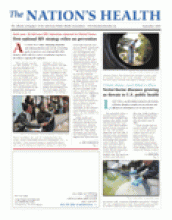Childhood immunizations — undeniably one of public health’s top interventions of all time — are at risk of becoming a victim of their own success. So effective are vaccines at preventing death and disease that growing numbers of parents are now more concerned about the vaccines’ safety and side effects than the diseases they prevent, a new study has found.
The study, released in August by the Association of State and Territorial Health Officials, found that while a strong majority of parents support vaccinations for their children, worries about vaccine safety continue to pose challenges for health workers. Of the nearly 1,300 U.S. parents and guardians surveyed, 47 percent reported being “very” comfortable or confident with their children receiving vaccinations, while 43 percent were just comfortable or confident. However, 8 percent of parents or guardians surveyed were not comfortable or confident with their children receiving vaccinations, and 2 percent indicated that they were “very” uncomfortable about vaccines for their children. Among all respondents, 16 percent reported having refused a vaccine for a child. Influenza and human papillomavirus vaccines were the most commonly refused, followed by chickenpox vaccine. Additionally, 13 percent of respondents reported having delayed a vaccine, with the combined diptheria, tetanus and pertussis vaccine being the most commonly delayed.
Current communication methods used by health workers do not appear to be alleviating parents’ concerns about vaccine safety, the study authors said.
“The fear of disease is not as prevalent as it was in the past, so convincing parents that vaccines continue to be necessary is an ongoing challenge,” said Paul Jarris, MD, MBA, executive director of the Association of State and Territorial Health Officials.
According to the study, the most common reason given by parents not to vaccinate was the risk of adverse effects. For some parents, negative health events following vaccination — though rare — are more apparent than the diseases themselves, leading to anti-vaccination sentiments and increased demands on health workers to communicate the effectiveness of vaccines to parents. The study calls on state and territorial public health agencies charged with promoting, monitoring and tracking vaccine use to understand the reluctance of some parents and guardians to fully vaccinate their children and identify effective messages about the benefits of vaccines.
For example, misconceptions about thimerosal, a vaccine preservative with a long record of safe and effective use, continue to resonate among parents, but messages designed to reassure them that scientific studies do not support their concerns are the “least convincing and least believable” of the messages tested. According to the study, parents’ decisions are influenced by factors other than current scientific facts, so a better understanding of which messages resonate with the public about the benefits of vaccines is needed.
“If public health officials and providers can succeed in communicating the benefits of vaccines, then the country can continue to maintain high rates of coverage and avoid unnecessary loss of life due to vaccine-preventable diseases,” the study noted.
Thanks to vaccinations, many of the infectious diseases that once routinely killed or sickened many infants, children and adults have been eliminated or reduced in the United States. But according to the Centers for Disease Control and Prevention, the viruses and bacteria that cause vaccine-preventable disease and death still exist and can be passed on to people who are not protected by vaccines. For example, polio has been eliminated in most parts of the world, including the United States, but stopping vaccination before eradication is achieved would result in a resurgence of the disease.
Immunity from some vaccines can wear off over time. For example, vaccination is the best defense against pertussis, but protection from the childhood vaccine fades, requiring teens and adults to be revaccinated — even if they were completely vaccinated as children. Currently, several states are reporting increases in cases of pertussis, which is commonly called whooping cough. In California, for example, a statewide epidemic caused by the highly contagious respiratory tract infection is shaping up to be the worst in nearly 50 years, according to state health officials. As of late July, the number of illnesses in California due to whooping cough had climbed to more than 2,000 — a six-fold increase from the 349 whooping cough illnesses reported in California during the same period last year.
In California, pertussis booster vaccine rates among teens and adults continues to be low, according to state health officials. In addition to the typical series of five childhood pertussis immunizations, the California Department of Public Health is urging a pertussis booster vaccine for everyone ages 10 or older who has not yet received it, especially women of childbearing age and household contacts, caregivers and health care workers who have contact with pregnant women or infants.
“The pertussis epidemic is a sobering and tragic reminder that diseases long thought controlled can return with a vengeance,” Mark Horton, director of the California Department of Public Health, said in a statement in early August. “We can protect ourselves and the most vulnerable in our community by getting vaccinated today.”
For more information or to download “Communicating Effectively About Vaccines: Summary of a Survey of U.S. Parents and Guardians,” visit www.astho.org.
- Copyright The Nation’s Health, American Public Health Association









